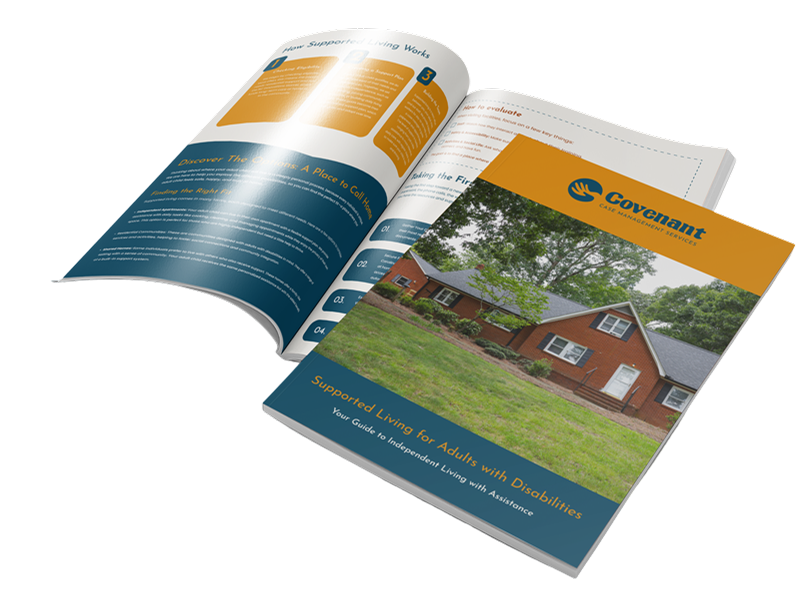
Building Independent Living Skills for Adults with Disabilities
Covenant Team
Oct 15, 2025
Get the Guidance You Deserve, Right to Your Inbox
Whether you’re a caregiver, care professional, or individual seeking independence, We aim to keep you informed and inspired. Receive updates on services, events, and stories of hope by signing up to become a part of our email list below.
Caring for a loved one with intellectual and developmental disabilities (IDD) comes with unique challenges, especially when fostering independence. Finding the balance between support and freedom can feel overwhelming, but you are not alone.
Transitioning into adulthood is an emotional journey. You may feel hopeful for the future yet uncertain as school-based services end. Every small victory, from heating leftovers to folding laundry, is worth celebrating.
This blog explores independent living skills for adults with disabilities, highlighting key areas of transition skills and practical ways you can support growth. From daily life skills to community engagement, these strategies help your loved one build confidence, independence, and a fulfilling life.
The Importance of Independent Living Skills
Every caregiver or parent dreams of a life filled with purpose for their child. For adult children with intellectual and developmental disabilities, this desire for purpose and belonging is just as strong. When we help our children develop independent living skills, we teach them to do things on their own, all while helping them build a full and meaningful life.
Every small success, like preparing a simple meal or managing a personal routine, builds confidence and self-worth. It transforms daily routines into impactful experiences that enrich the mind, body, and spirit. A greater sense of independence can open doors to more opportunities for growth and a higher quality of life. Ultimately, it allows your adult child to live a full life.
6 Essential Independent Living Skills
The journey toward independent living is unique for every adult with a disability but there is a broad range of skills to develop. When we focus on these areas, we’re helping our adult children build the foundation for a life filled with purpose.
Here are six of the most essential skills we can help foster.
1. Personal Care and Household Routines
Learning to care for oneself and a home is a big part of feeling independent. This includes things like managing personal hygiene, such as bathing, brushing teeth, and getting dressed. It also means taking care of their living space. You can help them with tasks like doing laundry and keeping their room clean.
2. Food and Nutrition
Helping your adult child learn about healthy food choices is so important. You can teach them how to plan a simple meal, create a grocery list, and shop for the ingredients. This includes basic cooking and nutrition skills, like warming up leftovers or making a simple snack. These are huge steps toward a more independent living lifestyle.
3. Community and Safety
Feeling safe and confident in the community is key, and you can work with your adult child on understanding personal safety skills. This includes fire safety in the home. You can also practice using public transportation or a ride-sharing service so they can get around safely. This helps them participate more fully in the community.
4. Managing Money and Time
These skills are a cornerstone of living an independent life. You can help your adult child learn money management for adults with disabilities. This includes understanding how to budget their money and use a bank account. You can also help them with time management and organization, like creating a simple schedule for the day.
5. Vocation and Self-Advocacy
Meaningful work offers a great sense of purpose and a real sense of belonging. You can explore vocational training options and supported employment programs to find a job that is the right fit for your adult child. As they gain confidence, they can learn to speak up for themselves. This self-advocacy and confidence building empowers them to express their needs and make their own decisions.
6. Healthcare and Leisure
Managing personal health is crucial. This can be as simple as remembering to take medication or knowing how to communicate with a doctor. Also, remember to foster hobbies and interests. Leisure skills are important for well-being and social connection, whether it’s through a group or an individual activity.
How to Promote Independent Living Skills
Empowering your adult child to live more independently begins in the home, creating opportunities for them to try new things and master new skills. Here are five practical tips you can start using today:
- Involve them in household tasks: Start with a simple task like sorting the laundry or setting the table for dinner. This helps them feel included and builds a sense of responsibility.
- Use visual aids: A simple picture schedule or a checklist can help guide your adult child through their morning or evening routines. This reduces anxiety and helps them build a sense of predictability.
- Practice through role-playing: If your adult child is nervous about a new social situation or wants to learn to advocate for their needs, you can practice with them. This helps them feel more prepared and confident when facing real-life scenarios.
- Explore adaptive tools: There are many assistive technologies for daily life. You can find things like adaptive rulers and pencil grips to help with fine motor skills, or even sensory-friendly items to help them focus and feel calm.
Turn passions into purpose: What does your adult child love to do? Maybe it’s gardening or listening to music. You can turn a passion into a purpose-filled activity, like tending to a small garden or creating a playlist for a family event.
The Role of Support and Partnership
This road toward building independent living skills is a collaborative partnership, and the right support can make all the difference. We are here to walk alongside your family, providing encouragement, resources, and space to explore.
Our goal is to help your adult child uncover their unique strengths. Take the first step toward the right independent living program, discover how Covenant’s services can help your loved one thrive with purpose here.
Download Your FREE Supported Living Guide!


